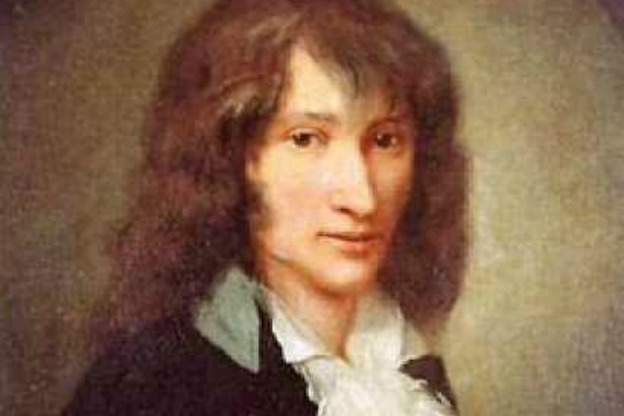
J.S. Bach is known for his many works of brilliant compositions like St. Matthew Passion, B minor Mass, and the Brandenburg Concertos. But Bach was a teacher too, mentoring over 80 students during the course of his career, not the least of them his own sons W.F. and Carl Phillip along with other familiar names like Kirnberger and Goldberg.
Bach's very last student, though, was one he taught on his deathbed-a fellow by the name of Johann Gottfried Müthel.
Johann Gottfried MüthelÂ
Müthel was one of seven kids. His dad was an organist and probably Müthel's first musical influence. He later studied with Johann Paul Kuntzen, (an organist in nearby Lübeck), before taking a job at the age of 19 as organist, chamber musician, and music educator for the prince and princess in Christian Ludwig II's court.
Müthel took a sabbatical from that job in order to pursue his own studies more, and it was during this leave of absence in 1750 that he went to Leipzig to see Bach.
Müthel lived in Bach's house for three months where he no doubt tried to absorb all he could from the mastermind. It's possible that Müthel took dictation from Bach, notating some of his very last works, since Bach was by this time blind from two unsuccessful eye operations.
Bach died three months after Müthel arrived. Subsequently, Müthel stepped up and took over as an interim director at Bach's church job in Leipzig for nine weeks. Müthel then toured around Germany taking lessons with Bach's son Carl Phillip in Potsdam, Bach's son-in-law J.D. Altnickol in Naumburg, Adolf Hasse in Dresden, and Telemann in Hamburg.
With all these new musical influences and experiences under his belt, Müthel wasn't long satisfied when he finally returned to his court job. Müthel cast a wide net for a new position, snagging a job in a part of Russia that is now Latvia in the city of Riga, first as a private musician in an aristocrats house before becoming organist and a lifetime fixture at Riga's St. Peter's Church.
Origins of the Solo Keyboard Concerto
Bach's Brandenburg Concerto No. 5 is a piece in which many have traced the origins of the solo keyboard concerto.
It's no surprise then that most of what Müthel published were keyboard works, specifically keyboard concertos that were no doubt inspired, at least in part, by his early training with Bach and contacts within Bach's circle. You can hear Bach's influence in Müthel's D major concerto.
A Quirky Character
Müthel was by all accounts a quirky character. He didn't publish or even write very much music down for that matter. Müthel explained himself in a letter: "I have devised many a piece when in good humour and a cheerful mood, but only in outline, and the pieces await a happy disposition of my mind for further work to be done, for I do not care to work when I am not disposed to it. And that true cheerfulness of mind I require to work visits me only rarely!"
I have devised many a piece when in good humour and a cheerful mood, but only in outline, and the pieces await a happy disposition of my mind for further work to be done, for I do not care to work when I am not disposed to it. And that true cheerfulness of mind I require to work visits me only rarely!
And Muthel had a reputation for being a wee bit high maintenance, too. Though it's likely overly hyperbolic, a 1782 description of the composer recalled that he "would never perform other than in winter time when deep snow covered the streets, in order…not to be disturbed by the clatter of carriages passing by."
But for all his idiosyncratic ways, 18th century music historian Charles Burney always had good things to say about Muthel's compositions, writing that they were "so full of novelty, taste grace and contrivance, that I should not hesitate to rank them among the greatest productions of the present age."
Another music writer, Johann Reichardt, corroborates Burney's assessment, calling Muthel's style "innovative" and "characterized by charm," especially in regards to the orchestral accompaniments of the keyboard concertos of which Reichardt said demanded "without exception masterful performers."
Müthel and the Bassoon
Besides the keyboard concertos, the only other concertos Müthel seems to have written down are two concertos for bassoon. Müthel must have liked the bassoon, and we get a taste for how he wrote for the instrument in the middle movement of his d minor keyboard concerto-a movement which seems less like concerto and more like chamber music.
Arte dei Suonatori and Marcin Swiatkiewicz
Listening through this 2015 BIS release of Müthel's Five Keyboard Concerto's, it's in the slow movements that Müthel's most original and individual compositional voice comes to the fore. The performances given by both the Polish orchestra Arte dei Suonatori and harpsichordist Marcin Swiatkiewicz are something to relish.
Perla Barocca
Swiatkiewicz specializes in harpsichord, clavichord, organ, and historical pianos. He also teaches at the music academy in Katowice and is an active composer. Swiatkiewicz's bio printed in the CD booklet claims that he is known for his inventive basso continuo realizations.
[You can hear Swiatkiewicz's inventive continuo collaborations with violinist Rachel Podger in a program of 17th-century Italian music on another recently released recording by Channel Classics called Perla Barocca.]









